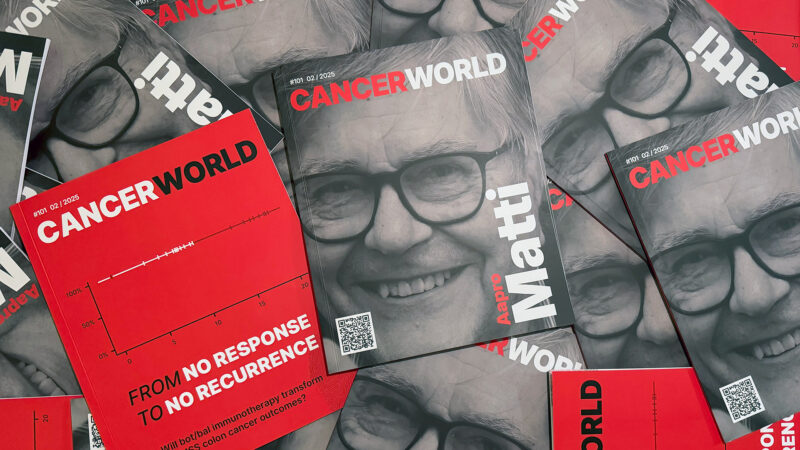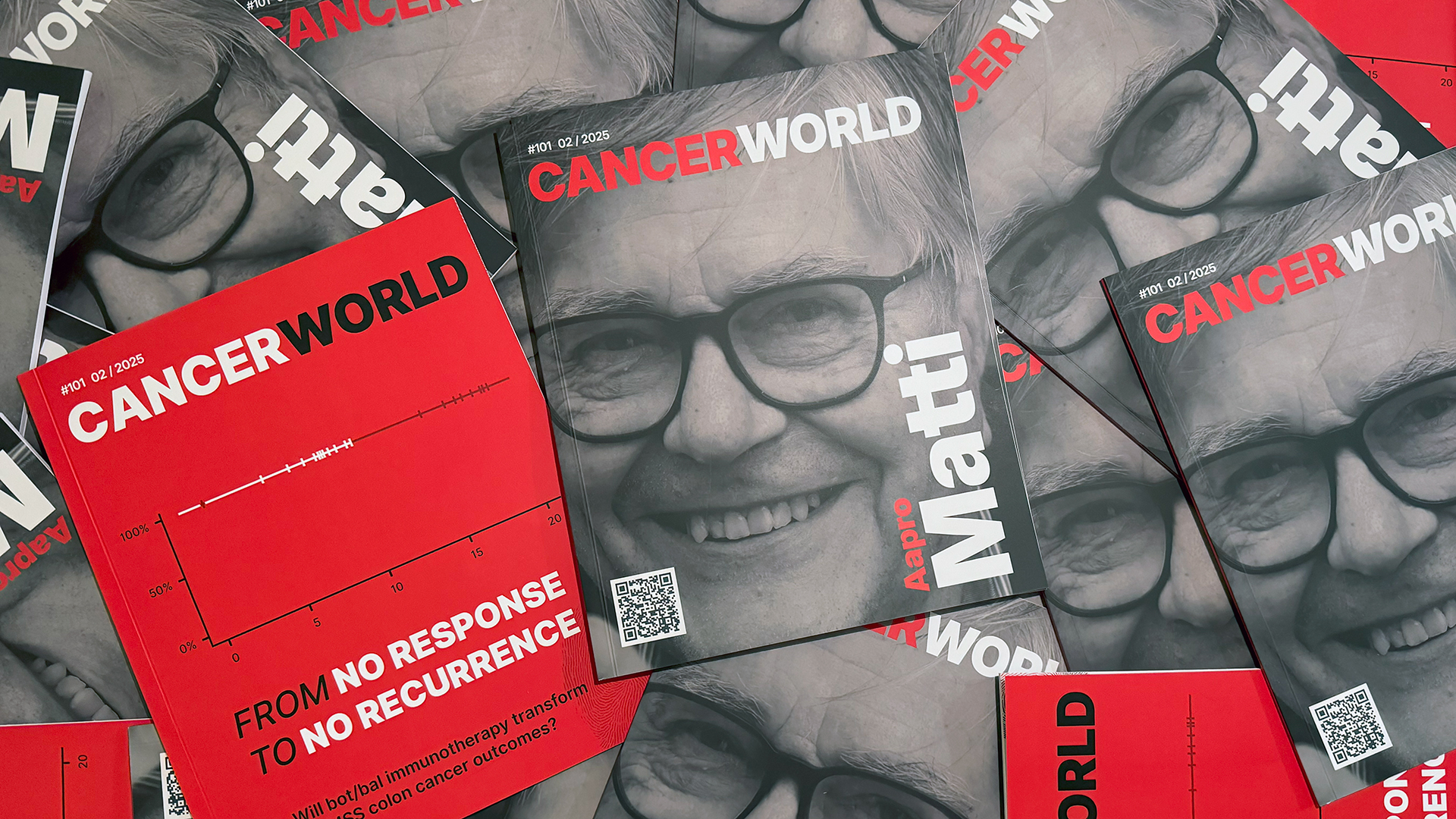After transitioning to a fully digital format in 2022, CancerWorld is making a highly anticipated return to print with its February 2025 issue. This edition delivers in-depth analysis, expert perspectives, and the latest advancements in cancer research, policy, and treatment.
This double-sided issue features an in-depth cover story on Dr. Matti Aapro, a pioneer in oncology and mentorship, while the back cover spotlights the revolutionary potential of botensilimab and balstilimab in microsatellite-stable (MSS) colorectal cancer—a disease long resistant to immunotherapy.
Beyond these cover stories, the issue explores breakthroughs in pancreatic cancer detection, lung metastasis research, childhood cancer treatment in India, China’s evolving approach to cancer care, the future of Europe’s Beating Cancer Plan, and the global advocacy efforts of Oncothon 2025. A special editorial by CancerWorld’s Editor-in-Chief Adriana Albini highlights the critical role of sleep in cancer prevention and treatment.
Key Features of the February 2025 Issue
Dr. Matti Aapro: An Oncologist who needs no introduction
Our cover story is a tribute to Dr. Matti Aapro, a legendary oncologist whose contributions to geriatric oncology, supportive care, and cancer policy have shaped the field for decades. Through leadership roles at MASCC, ECO, and SPCC, Aapro has influenced global oncology standards and mentored countless professionals.
His philosophy on collaboration and mentorship is central to his success:
“You don’t do these things by yourself. You need the right people around you.”
In this exclusive interview, he shares insights into his career, his early aspirations in architecture, his love story, friendships with leading oncologists and his belief that asking the right questions is key to progress:
“Always ask questions. Don’t be shy. You ask questions, you will learn.”
His life’s work underscores that oncology is not just about science but human connections, shared knowledge, and challenging assumptions.
Botensilimab and Balstilimab: A New Era for MSS Colorectal Cancer
For decades, MSS colorectal cancer—accounting for 80% of CRC cases—was considered untreatable with immunotherapy. However, clinical trials of botensilimab (a novel Fc-enhanced CTLA-4 inhibitor) and balstilimab (a PD-1 inhibitor) are changing that narrative.
UNICORN and NEST trials for localized MSS colorectal cancer show:
- 29% complete response rates in MSS tumors—a breakthrough result.
- Zero recurrences at interim follow-ups, redefining expectations.
- Better disease control and survival outcomes compared to standard therapies.
These results challenge the long-held belief that MSS CRC is immunologically silent, signaling a shift toward transforming “no response” into “no recurrence.”
Why Rest Matters More Than You Think: Sleep and Cancer
A special editorial by Adriana Albini and Francesca Albini sheds light on the often-overlooked role of sleep in cancer prevention and treatment. Sleep disturbances—insomnia, sleep apnea, and irregular sleep patterns—are common in cancer patients but rarely addressed in routine care.
Key findings on sleep and cancer include:
- Epidemiological studies link poor sleep quality to increased risks of colorectal, prostate, lung, ovarian, and breast cancers.
- Disrupted circadian rhythms, lower melatonin levels, chronic inflammation, immune suppression, and insulin resistance contribute to cancer development.
- Modern guidelines recommend integrating sleep assessments, cognitive behavioral therapy for insomnia (CBT-I), and evidence-based sleep interventions into routine oncology care.
The article argues that sleep should not be seen as a minor concern but a crucial component of cancer care and prevention, emphasizing that restoring sleep quality is both an individual necessity and a public health priority.
China’s National Cancer Guidelines: A Shift Toward Localized Oncology Care
China has taken a major leap in oncology self-sufficiency with the launch of its 2025 Integrated Cancer Care Guidelines, covering 53 cancer types. Developed by the China Anti-Cancer Association (CACA), these guidelines blend local clinical evidence with Traditional Chinese Medicine (TCM), reflecting China’s growing confidence in setting its own medical standards.
Announced at the China Integrative Oncology Conference in Xi’an—where over 60,000 experts gathered—this milestone marks a significant step in global cancer care.
Liu Hong from Tianjin Medical University explains:
“The human body functions as a whole… cancer is a systemic issue.”
What does this mean for patients and the future of oncology?
MRI technique can identify pre-malignant pancreatic lesions
A study published in Investigative Radiology highlights Diffusion Tensor Imaging (DTI), an MRI technique, as a breakthrough tool for detecting pre-malignant pancreatic lesions.
Led by Carlos Bilreiro and Noam Shemesh at the Champalimaud Clinical Centre in Lisbon, the study showed that DTI detected PanIN lesions in mouse models and human pancreatic samples with nearly 100% sensitivity and specificity.
“This study represents a first step towards the early detection of pancreatic cancer with MRI, even before the cancer develops,” says Bilreiro.
By using water diffusion as a natural tracer for tissue microstructure, this method has the potential to significantly improve pancreatic cancer survival rates, as early detection remains the best chance for curative treatment.
Key link in mechanism promoting lung metastases from breast cancer
A study published in Nature reveals that aspartate—a key metabolite—plays a critical role in preparing the lungs for breast cancer metastases.
Led by Sarah-Maria Fendt, researchers found that primary breast tumors send biochemical signals that increase aspartate levels in the lungs, fostering a microenvironment for metastasis.
“Even before breast cancer cells arrive in the lung, the primary tumor was preparing the metabolites needed to support metastatic growth,” explains Fendt.
These findings provide potential therapeutic targets, with drugs like memantine and DFMO showing promise in disrupting this metastatic priming process.
How Indian centres slashed treatment drop-out rates in childhood cancer
India’s Tata Memorial Hospital has dramatically improved childhood cancer treatment retention rates, reducing treatment abandonment from 1 in 5 children in 2010 to just 1 in 50 by 2022.
This success is largely attributed to the ImPaCCT Foundation, which provides:
- Accommodation, nutritional support, and psycho-social care
- Bereavement assistance for grieving families
- A survivorship clinic ensuring long-term follow-up
With childhood cancer survival rates improving from 41% in 2010 to 58% by 2018, these initiatives showcase how holistic support systems can dramatically enhance treatment outcomes.
The Future of Europe’s Beating Cancer Plan
Richard Price of the European Cancer Organisation (ECO) emphasizes the need to highlight the successes of Europe’s Beating Cancer Plan to secure its future.
He cites the unexpected regional collaboration among Southeast European nations to eliminate preventable HPV-related cancers, directly inspired by the Plan.
However, he warns that with the EU’s seven-year funding cycle ending in 2027, shifting political priorities could threaten continued investment in oncology:
“We have to make the case to continue financing.”
Stella Kyriakides: Making Personal Experience a Political Priority
In an exclusive interview, Stella Kyriakides, EU Commissioner for Health and Food Safety (2019-2024), reflects on cancer screening reforms, improved access to medicines, and Europe’s first cancer-specific mental health initiative.
She stresses the importance of equity in cancer care and urges policymakers to keep health at the top of the political agenda:
“We must never take progress for granted. Health must always remain a political priority.”
Oncothon 2025: A Global Call to Action
The Second Global OncoThon, co-hosted by OncoDaily and SIOP, brought together world leaders, oncologists, and advocates to address the research gap in childhood cancer.
Key voices included:
- Lionel Messi: “There are children who could be cured, but they don’t have the chance.”
- Richard Gere: “Your donation can help save thousands of children.”
- Princess Dina Mired of Jordan: “Donate $10. Challenge three friends to do the same.”
The campaign runs until Childhood Cancer Awareness Month in September 2025, aiming to raise funds and drive systemic change in pediatric oncology.
The February 2025 issue of CancerWorld marks a major return to print, bringing together cutting-edge research, policy insights, and expert perspectives from global oncology leaders.












